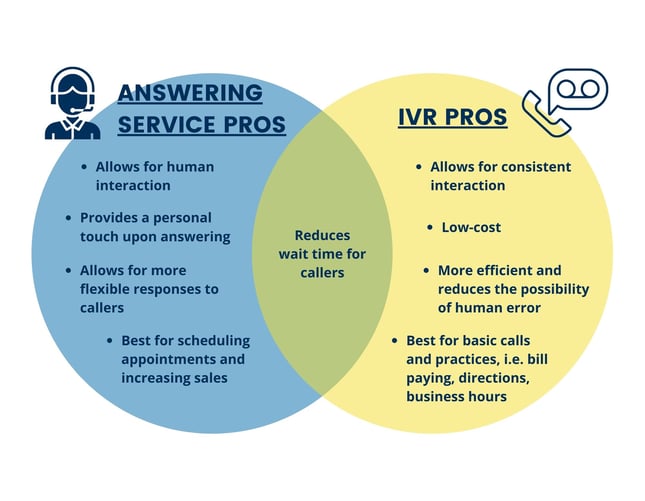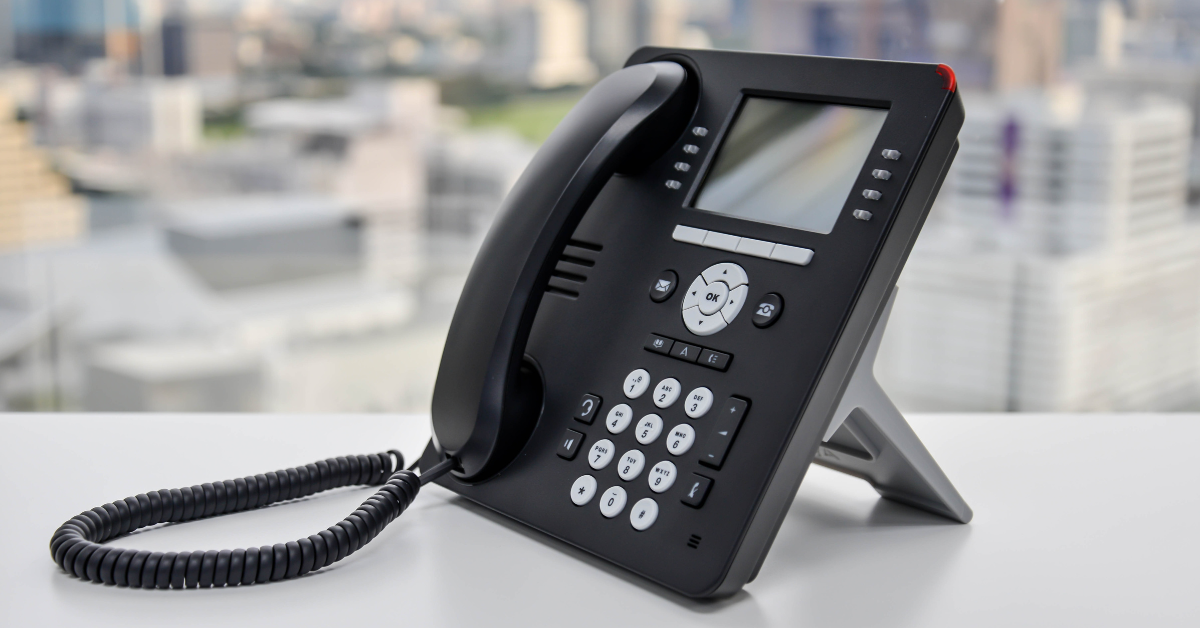Have you ever called a business and been met with the voice of a robot jabbering on and on about the operating hours of the company, followed by a long list of options that has nothing to do with the reason you’re calling? “Press this button to reach this department,” and so on and so forth? When this happens to me, I typically get so frustrated that I just press “zero” in hopes that I reach the operator, and even then, sometimes the list just repeats itself. With this frustrating experience of mine, as well as of multitudes of other consumers, in mind, it can be hard to understand why businesses insist on using IVRs (Interactive Voice Response systems, a form of call automation). Read on to explore the pros and cons of both IVRs and answering services to determine which would be best for your company.

Defining IVR
IVR (Interactive Voice Response) is a direct product of this age of unprecedented technological advancement. With this form of call automation, businesses can prerecord customized greetings, and callers are able to select their desired extension from a list of prompts. Engaging with an IVR system usually plays out in the following way:
“Thank you for calling. Your call is very important to us. Press 1 for sales. Press 2 for technical support. Press 3 for billing. Press 4 to speak with a representative.”
IVRs collect information about your caller and then direct them to the appropriate department or operator. Despite how frustrating an IVR can be to reach, using an IVR system does have some benefits.
What are the pros of an IVR system?
Efficiency
IVRs allow for receptionists or representatives at a call center to take as few calls as possible. They immediately direct the caller to the extension they select.
Budget
IVRs cost significantly less than employing a receptionist or a call answering service.
Consistency
By having a prerecorded message, your business is represented in a consistent manner to all callers.
Despite these benefits, “more than half (51%) of consumers have abandoned a business altogether because they've reached… Interactive Voice Response (IVR) – losing that company $262 per customer every year” (Cision, 2019). There are, however, cons beyond losing profit when it comes to IVR systems.
What are the cons of an IVR system?
Lack of Flexibility
IVRs may have difficulty understanding your customer’s accent or tone. Additionally, no set amount of menu items can account for all the things a caller may have to say to a business.
Unresponsive
IVR menus can easily become too long or complex. Most callers don’t have the patience to sit and listen to all the IVR’s options, especially when there’s not even an option presented for what they’re calling for.
Lack of Personality
IVRs typically use a robotic voice that does not portray compassion.
Defining an Answering Service
In an age where people are feeling increasingly isolated (and sometimes even confused or annoyed) by the rapid progress of technology, an answering service offers the warmth of a live human voice and takes on the task of answering your calls. However, agents at an answering service don’t only take messages and direct calls, they also serve as a representative of your business. Just as with an IVR system, there are pros and cons to an answering service.
What are the pros of an answering service?
Personal Touch
As previously mentioned, IVR systems tend to drive customers away from business. An answering service that employs people can provide live voices to answer your company’s calls. With people answering your calls, as opposed to a robot, your callers can be met with an appropriate emotional response, whether the situation calls for (no pun intended) an agent to respond with a happy tone of voice, or a calm, controlled tone in the case of an emergency.
Professionalism
A professional answering service educates their agents exactly how to act as an extension of your business for the duration of calls with your customers. They use professional, proper phone center etiquette.
Flexibility
Not every call follows the same script. Live agents can assist callers who call to extend their thanks or to ask a question about a product, whereas those callers might just hang up upon reaching an IVR.
%20(1).jpg?width=864&name=Untitled%20(13%20%C3%97%207%20in)%20(1).jpg)
What are the cons of an answering service?
Cost
Live call agents are like an extension of your staff, and while an answering service is less expensive than hiring a full-time employee, it is more expensive than the average IVR.
Training
Call agents require training to ensure that they’re familiar with the ins and outs of your business, and even more so, to ensure that they’re handling all calls according to your standards. Therefore, working with an answering service might require a bit more patience than just getting an IVR service would.
Industry Irregularities
The quality of call agents varies from company to company. Therefore, it’s important to do your research when it comes to selecting an answering service. If you’re curious about how Dexcomm trains our agents, click here.
Which One is Best for My Company?
So you’ve reached this point in the blog post and are still feeling really stuck on whether an IVR or an answering service is the right way to go for your business. Consider this question: in your line of work, can you risk a machine “misunderstanding” a customer or a message? If your industry revolves around sensitive human interactions, it is crucial to have an answering service that can provide an appropriate human response. Do you work in the medical field? Or what about in the HVAC, plumbing, or electrical industry, where people can experience emergencies in their homes? For such professions, a live, human voice will make all the difference on calls. A machine cannot discern whether the voice on the other end of the line is angry, irritated, or happy, and it certainly won’t be able to tell if your caller is having an emergency.
That being said, something else to consider is how much you value providing good customer service to your customers. An automated machine cannot evoke the necessary sympathy or compassion it sometimes requires to pacify callers in stressful situations. For example, funeral homes should especially want a dignified, compassionate response to their callers.

Conclusion
With each new wave of technology, we get new options for choosing how to respond to customers; therefore, choosing the most efficient and effective way to handle business can be a difficult choice to make. While IVRs have made great strides at replicating human interaction at call centers, and are more cost-effective, there are gaps that automation cannot yet bridge. On the other hand, answering services are a bit more expensive, but they can aid in increasing sales and providing better customer service. If learning a bit more about either of these communication services would help you to make a more informed decision for your business, reach out to Dexcomm today, or click here!





